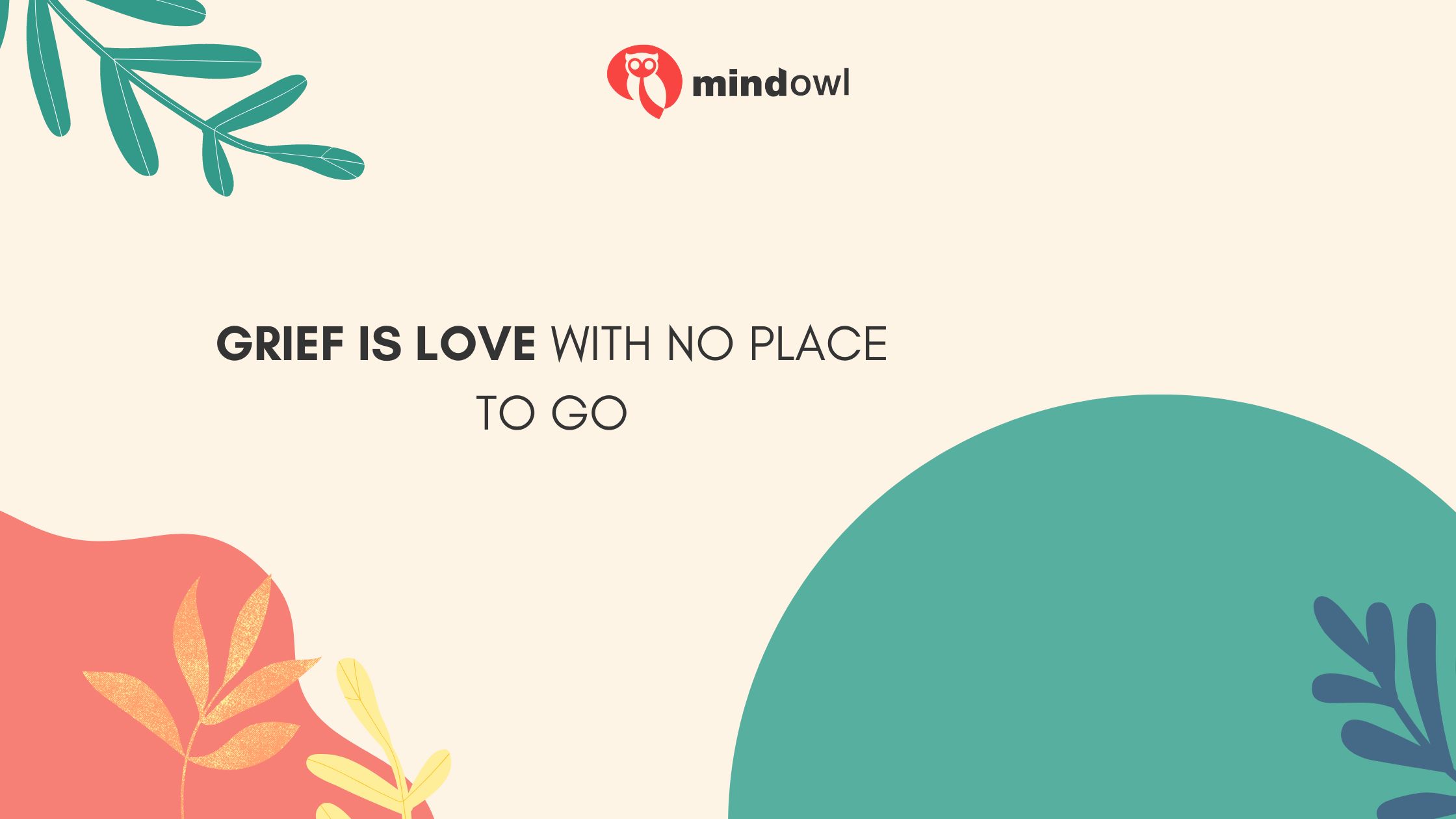
Grief can feel like an overwhelming emotion, leaving us with a sense of love that seemingly has no place to go. Often attributed to Jamie Anderson, the saying “grief is love with no place to go” offers a fresh perspective on coping with loss.
This article aims to help you understand grief in this context, offering guidance and tools for your healing journey. Let’s explore together how unspent love can aid our navigation through heartache.
Key Takeaways
- Grief can be seen as love that has no place to go, manifesting both physically and emotionally.
- It is important to acknowledge and express grief, finding healthy outlets for our love and emotions.
- Honoring the memory of loved ones and transforming grief into acts of love and kindness can bring healing and meaning.
- Providing a safe space for expression and offering empathetic understanding is crucial in supporting others through their grief journey.
Understanding Grief as Love

Grief can be seen as love that has no place to go, a powerful emotion that manifests both physically and emotionally.
The concept of unspent love
Unspent love is the idea that grief is all the love you want to give but cannot. When we lose someone, this love has no place to go and it stays with us. This leads to our tears, the ache in our bodies and a lump in our throats.
This unspent love blends with grief until there is no way of telling them apart. So, we can say that grief is just unspent love with nowhere to go.
The physical and emotional manifestations of grief
Grief hits you hard in both mind and body. You feel a pain deep inside your chest. It is like a lump in your throat that won’t go away. You may shed tears from the corners of your eyes without warning.
Sleep might be hard to find and food may lose its taste. Your body feels tired but rest doesn’t come easy, as grief takes away all your energy too. In short, grief shows itself through many signs of sadness felt in the heart and seen on the body too.
Navigating Grief

Acknowledging and expressing grief is crucial in the journey of navigating through it, allowing us to find healthy outlets for our love and emotions.
The importance of acknowledging and expressing grief
Grief is a big feeling. It can bring many different emotions. You may feel sad, upset or even angry. These feelings are normal when we lose someone we love. Saying how you feel is good for you.
Ignoring grief makes the pain stronger over time. People need to know their own feelings of loss and say them out loud. This helps make the heavy feeling of grief lighter day by day.
Finding healthy outlets for love and emotions
We need ways to show our grief and let out our love with no place to go. It helps us to move forward.
- Cry when you feel like it. It’s okay if a lump forms in your throat, tears fill the corners of your eyes, or grief makes your chest ache.
- Write down your thoughts. You can share feelings about the loved one you have lost.
- Spend time in places that bring comfort. You might find peace in nature, or at a favourite spot.
- Make art or music that expresses your emotions.
- Talk with friends and family about the one you’ve lost.
- Find comfort in physical actions, like hugging a pet or taking care of plants.
- Help others who are also feeling loss and grief.
- Be kind to yourself by resting when needed and eating good food.
- Practice deep breaths which invite calm into your mind and body.
Finding Healing and Meaning in Grief
Honour the memory of loved ones and transform grief into acts of love and kindness.
Honoring the memory of loved ones
We can honor our loved ones who are no longer with us in many ways. One way is through grief rituals. These help us deal with loss and find peace. Another way is to find joy and meaning again, even though we miss them.
This shows love for them and for life itself. We may feel sad when we think of them but that’s okay too. It’s fine to carry these feelings for years as a part of the process, showing that they remain important in our hearts.
Transforming grief into acts of love and kindness
Grief can turn into acts of love and kindness. Here is how:
- Pay homage to your lost one by doing things they loved. This keeps their memory alive.
- Have a charity event in their name. It shows you loved them and helps others too.
- Write down your feelings. They could turn into a comforting book or song for others.
- Plant a tree or dedicate a park bench to your loved one’s name. Nature can help you mourn and heal.
- Use the energy from grief to help others in need, like joining support groups or volunteering at shelters.
- Share stories about your loved one with friends and family members.
- Create art inspired by them: draw, paint, write poetry or songs, make jewelry, or create digital works of art.
- Provide meals for those dealing with similar loss – it brings comfort and eases the burden on others who grieve.
Supporting Others in Grief
Providing a safe space for expression and offering empathetic understanding is crucial in supporting others through their grief journey.
Providing a safe space for expression
A safe place is key for those facing grief. It’s a spot where they can share their feelings without fear. Friends and family can make this safe space. They listen and give comfort when a person feels low.
Grief counseling also offers such places to talk about loss. Trained people guide the talks here. Being in these places eases worry and pain for many.
Offering empathy and understanding
To support someone who is grieving, it’s important to offer empathy and understanding. Grief can be a complex and overwhelming experience, so being there for them without judgment can make a big difference.
Listen attentively and validate their feelings, letting them know that it’s okay to feel however they’re feeling. Avoid offering unsolicited advice or trying to fix things – instead, be present and show genuine care.
Recognize that everyone grieves differently, so respect their individual process and pace. By providing a safe space for expression and acknowledging the depth of their pain, you can help them feel understood during this difficult time.
Conclusion: Embracing Grief as a Manifestation of Love
In conclusion, embracing grief as a manifestation of love can help us navigate the difficult journey of loss. It’s important to acknowledge and express our grief, finding healthy ways to let out the love we still have.
By honoring the memory of our loved ones and transforming grief into acts of kindness, we can find healing and meaning in our sadness. Supporting others through their grief by providing empathy and understanding is also crucial.
Remember, grief is just love with no place to go, so let’s embrace it as a natural part of life.
FAQs
Q: What is grief?
A: Grief is the intense sorrow and sadness that one feels when they lose someone or something important to them.
Q: How does grief manifest itself?
A: Grief can manifest itself in various ways, including emotional, physical, and psychological symptoms. It is a complex process that can involve feelings of sadness, anger, guilt, and confusion.
Q: Is grief the same as mourning?
A: No, grief and mourning are two different concepts. Grief is the internal and emotional response to loss, while mourning is the external expression of grief, such as rituals, ceremonies, and other public displays of grief.
Q: How long does grief last?
A: There is no set time frame for grief. It is a personal and individual journey, and the duration of grief can vary greatly depending on the person and the circumstances of the loss.
Q: Can grief be a positive experience?
A: While grief is often associated with pain and sadness, it can also be a transformative and healing process. It can help us learn and grow, and it can ultimately lead to personal development and a deeper understanding of life.
Q: What is the quote “Grief is love with no place to go” all about?
A: This quote highlights the connection between grief and love. It suggests that grief is the result of unspent love and that even in the midst of grief, love still exists, but it has no place to be directed.
Q: How can grief help us feel better?
A: Grief can help us feel better by allowing us to acknowledge and express our emotions. By giving ourselves permission to grieve, we can release the pain and sadness associated with the loss and gradually find healing and comfort.
Q: Is it normal to feel shock after a loss?
A: Yes, feeling shock after a loss is a normal and natural response. Shock is our mind’s way of protecting us from the full impact of the loss, and it can help us cope with the initial overwhelming emotions.
Q: Why shouldn’t we ignore grief?
A: Ignoring grief can lead to unresolved emotions and prolonged suffering. It is important to acknowledge and address grief so that we can process our feelings and find ways to heal and move forward.
MindOwl Founder – My own struggles in life have led me to this path of understanding the human condition. I graduated with a bachelor’s degree in philosophy before completing a master’s degree in psychology at Regent’s University London. I then completed a postgraduate diploma in philosophical counselling before being trained in ACT (Acceptance and commitment therapy).
I’ve spent the last eight years studying the encounter of meditative practices with modern psychology.

